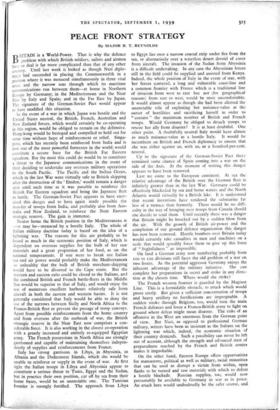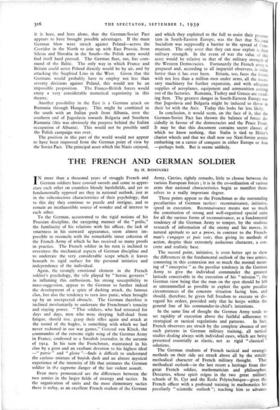PEACE FRONT STRATEGY
By MAJOR B. T. REYNOLDS
BRITAIN is a World-Power. That is why the defence problem with which British soldiers, sailors and airmen have to deal is far more complicated than that of any other country. Until last week it looked as though Nazi diplo- macy had succeeded in placing the Commonwealth in a position where it was menaced simultaneously in three vital areas and the narrow seas through which its maritime communications run between them—at home in Northern Europe by Germany; in the Mediterranean and the Near East by Italy and Spain; and in the Far East by Japan. The signature of the German-Soviet Pact would appear to have modified this situation.
In the event of a war in which Japan was hostile and the United States neutral, the British, French, Australian and New Zealand forces, which would certainly be co-operating in this region, would be obliged to remain on the defensive. Hong-kong would be besieged and compelled to hold out for some time without hope of reinforcement or relief. Singa- pore, which has recently been reinforced from India and is now one of the most powerful fortresses in the world, would constitute a secure base for the British Far Eastern squadron. But the most this could do would be to constitute a threat to the Japanese communications in the event of their deciding to undertake any overseas military operations in the South Pacific. The Pacific and the Indian Ocean, which in the last War were virtually safe to British shipping after the destruction of the ' Emden,' would remain a danger area until such time as it was possible to reinforce the British Far Eastern squadron and bring the Japanese fleet to battle. The German-Soviet Pact appears to have exor- cised this danger and to have again made possible the transfer of troops from India, and probably also from Aus- tralia and New Zealand, to reinforce the Near Eastern strategic reserve. The gain is immense.
Nearer home the British position in the Mediterranean is —or may be—menaced by a hostile Italy. The whole of Italian military doctrine today is based on the idea of a lightning war. The reasons for this are probably to be found as much in the economic position of Italy, which is dependent on overseas supplies for the bulk of her raw materials and a great proportion of her food, as on the national temperament. If war were to break out Italian sea and air power would probably make the Mediterranean so unhealthy that the bulk of British merchant-shipping would have to be diverted to the Cape route. But the western and eastern exits could be closed to the Italians, and the combined British and French battle-fleets in the Middle Sea would be superior to that of Italy, and would enjoy the use of numerous excellent harbours relatively safe from aircraft in both the eastern and western basins. It is not generally considered that Italy would be able to deny the use of the narrows between Sicily and North Africa to the Franco-British fleet or prevent the passage of troop convoys. Apart from possible reinforcements from the home country and from overseas after the outbreak of war, the British strategic reserve in the Near East now comprises a con- siderable force. It is also working in the closest co-operation with a greatly increased and entirely re-equipped Egyptian army. The French possessions in North Africa are strongly garrisoned and capable of maintaining themselves indepen- dently of supplies and reinforcements from France.
Italy has strong garrisons in Libya, in Abyssinia, in Albania and the Dodecanese Islands, which she would be unable to reinforce or supply in the event of war. At first sight the Italian troops in Libya and Abyssinia appear to constitute a serious threat to Tunis, Egypt and the Sudan, but in practice their own position, cut off by sea from their home bases, would be an unenviable one. The Tunisian frontier is strongly fortified. The approach from Libya to Egypt lies over a narrow coastal strip under fire from the sea, or alternatively over a waterless desert devoid of cover from aircraft. The invasion of the Sudan from Abyssinia is a difficult undertaking. In any case the Abyssinian forces still in the field could be supplied and assisted from Kenya. Indeed, the whole position of Italy in the event of war, with her forces scattered, a long and vulnerable coast-line and a common frontier with France which is a traditional line of invasion from west to east but not (for geographical reasons) from east to west, would be most uncomfortable. It would almost appear as though she had been allotted the unenviable role of exploiting her nuisance-value at the outset of hostilities and sacrificing herself in order to " contain " the maximum number of British and French troops. Would Germany be obliged to detach troops to rescue her ally from disaster? It is at least doubtful. One other point. A doubtfully neutral Italy would have almost as much nuisance-value as a hostile Italy. It would be incumbent on British and French diplomacy to ensure that she was either against us, with us, or a hundred-per-cent. neutral.
Up to the signature of the Get man-Soviet Pact there remained some chance of Spain coming into a war on the side of the Axis. At the moment of writing this danger appears to have been removed.
Last we come to the European continent. At sea the relative advantage of the British over the German fleet is infinitely greater than in the last War. Germany could be effectively blockaded by sea and home waters and the North Atlantic would virtually be a British lake. It is understood that recent inventions have rendered the submarine far less of a menace than formerly. There would be no diffi- culty in the way of bringing over troops from Canada should she decide to send them. Until recently there was a danger that Britain might be knocked out by a sudden blow from the air. With the growth of British air-power and the completion of our ground defence organisation this danger has now been removed. Hostile bombers over Britain today would certainly take casualties in men and machines on a scale that would speedily force them to give up this form of " frightfulness " as impossible.
On land a German army now numbering probably from oo to 120 divisions still faces the old problem of a war on two fronts. As the potential aggressor Germany enjoys the inherent advantage of the military initiative. She can complete her preparations in secret and strike in any direc- tion at the chosen time. Where would she strike?
The French western frontier is guarded by the Maginot Line. This is a formidable obstacle, to attack which would prove costly. But given a sufficient concentration of troops and heavy artillery no fortifications are impregnable. A sudden stroke through Belgium, too, would turn the main French defences and force a Franco-British army to fight on ground where defeat might mean disaster. The risks of an offensive in the West are enormous from the German point of view.. But Nazi, as opposed to professional German military, writers have been as insistent as the Italians on the lightning war which, indeed, the economic situation of their country demands. Such a possibility can never be left out of account, although the strength and advanced state of preparedness reached by the French and British armies makes it improbable.
On the other hand, Eastern Europe offers opportunities for manoeuvre, political as well as military, racial minorities that can be used to disrupt a victim from within, open flanks to be turned and raw materials with which to defeat a hostile blockade. Russian supplies, too, would now presumably be available to Germany in war as in peace. An attack here would undoubtedly be the safer course, and it is here, and here alone, that the German-Soviet Pact appears to have brought possible advantages. If the main German blow were struck against Poland—across the Corridor in the North to join up with East Prussia, from Silesia and Slovakia in the South—the Polish army would find itself hard pressed. The German fleet, too, has com- mand of the Baltic. The only way in which France and Britain could assist Poland directly would be by air, and by attacking the Siegfried Line in the West. Given that the Germans would probably have to employ not less than seventy divisions against Poland, this would not be an impossible proposition. The Franco-British forces would enjoy a very considerable numerical superiority in this theatre.
Another possibility in the East is a German attack on Rumania through Hungary. This might be combined in the south with an Italian push from Albania, over the southern end of Jugoslavia towards Bulgaria and Southern Rumania (this was obviously the purpose behind the Italian occupation of Albania). This would not be possible until the Polish campaign was over.
The position in this part of the world would not appear to have been improved from the German point of view by the Soviet Pact. The principal asset which the Nazis enjoyed, and which they exploited to the full to assist their penetra.. tion in South-Eastern Europe, was the fact that Na.ional Socialism was supposedly a barrier to the spread of Com.. munism. The only asset that they can now exploit is their military strength. In the event of war the value of this asset would be relative to that of the military strength of the Western Democracies. Fortunately the French army is prepared and, according to all impartial observers, is today better than it has ever been. Britain, too, faces the future with not less than a million men under arms, all the neces- sary machinery for further expansion, and with adequate supplies of aeroplanes, equipment and ammunition coming out of the factories. Rumania, Turkey and Greece are stand- ing firm. The greatest danger in South-Eastern Europe was that Jugoslavia and Bulgaria might be induced to throw in their lot with the Axis. Today this looks far less likely.
In conclusion, it would seem, on the face of it, that the German-Soviet Pact has thrown the balance of forces de- cidedly in favour of the democracies and the Peace Front. It may be that this document contains secret clauses of which we know nothing, that Stalin is tied to Hitler's chariot wheels and that we shall now see Nazi-Soviet armies embarking on a career of conquest in either Europe or Asia —perhaps both. But is seems unlikely.



































 Previous page
Previous page